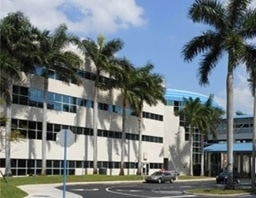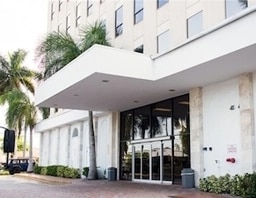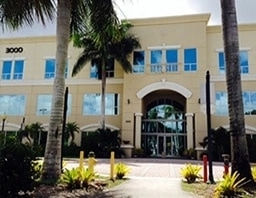
What is blepharoplasty?
A blepharoplasty, or simply referred to as eyelid surgery, is an operation that corrects sagging, or drooping eyelids as well as bags and bulges around the eyes. These conditions develop as a result of laxity of the eyelid skin and protrusion of fat around the eyes, features that make you look older and more tired than you feel, and may even interfere with your vision.
How is Eyelid Surgery Performed at Hollywood Dermatology?
Blepharoplasty usually takes one to three hours, depending on the extent of the surgery. In a typical procedure, incisions are made following the natural lines of your eyelids; in the creases of your upper lids, and just below the lashes in the lower lids. From these incisions, the skin is separated from the underlying fatty tissue and muscle, the excess fat is removed and sometimes sagging skin and muscle is trimmed. The incisions are then closed with very fine sutures.
If you have a pocket of fat beneath your lower eyelids but don't need to have any skin removed, a transconjunctival blepharoplasty may be performed. In this procedure, the incision is made inside your lower eyelid, leaving no visible scar. It is usually performed on younger patients with thicker, more elastic skin.
Who Is an Ideal Candidate for Eyelid Surgery?
Eyelid surgery helps people with loose eyelid skin and fat around their eyes. Anyone who wants to reduce the appearance of sagging, drooping eyelids and bags can benefit from eyelid surgery, which can help them look younger and more energized and—for some patients—even improve vision.
The best candidates for eyelid surgery are nonsmokers in good health, with no medical conditions that will interfere with the healing process. Candidates should also have realistic goals and expectations regarding the outcome of their procedure.
How Soon After My Procedure Will I See the Results of My Blepharoplasty?
After your blepharoplasty, your eyelids may feel swollen or sore or appear discolored, but these are all normal surgical results that will resolve on their own once we take your stitches out, approximately two to seven days after your surgery.
Following your procedure, we will provide you with a detailed timeline that shows what to expect after your surgery. This timeline will explain when you’ll get your stitches out, when you can read and watch TV, and when to resume wearing contact lenses.
Most patients can start seeing the results ten to 14 days after their procedure. However, it can take a few months to fully heal from the surgery and see the final results.
How Long Will the Results of My Blepharoplasty Last?
The results of your blepharoplasty surgery can be long-lasting, depending on how you age and how well you care for your skin. Your results will depend on your particular surgery, but you can expect them to last five to seven years.
As your skin ages, you may notice increased laxity, which could eventually require a minor revision procedure to correct. After your surgery, we will provide you with specific aftercare instructions to help speed up your recovery and maintain your results.
Will Eyelid Surgery Impact My Sight?
After blepharoplasty surgery, some patients experience blurry or double vision for a few days. You may also notice an increased sensitivity to light. However, these changes aren’t permanent and tend to dissipate on their own in a few weeks as your eyes recover.
If you were experiencing difficulties in your vision caused by significant drooping before your eyelid surgery, you might find that your vision has improved.
What Type of Anesthesia Will I Need for My Blepharoplasty Surgery?
Two types of anesthesia may be used when performing blepharoplasty surgery: general and local anesthesia.
General anesthesia is a powerful anesthetic that makes you unconscious and unaware of what is happening during your procedure.
On the other hand, local anesthesia is a less intense type of anesthetic where only a specific area or part of your body is numbed, so you remain conscious and aware throughout the procedure. This type of anesthesia is sometimes combined with conscious sedation, which helps you relax or enter a light sleep during the procedure.
The type of anesthesia used during your blepharoplasty surgery will depend on your particular surgical needs and personal preferences and will be discussed and decided upon during your consultation.
What Results Can I Expect from a Blepharoplasty?
Your eyelids may feel tight and sore as the anesthesia wears off, but you can control any discomfort with pain medication. You will need to keep your head elevated for several days, and use cold compresses to reduce swelling and bruising. For the first few weeks you may also experience excessive tearing, sensitivity to light, and temporary changes in your eyesight, such as blurring or double vision. The stitches will be removed two days to a week after surgery. Once they're out, the swelling and discoloration around your eyes will gradually subside, and you'll start to look and feel much better.
What is the Recovery from a Blepharoplasty?
You should be able to read or watch television after two or three days. However, you won't be able to wear contact lenses for about two weeks, and even then, they may feel uncomfortable for a while. Most people feel ready to go out in public (and back to work) in a week to 10 days.
What Is the Best Age to Have an Eyelid Lift?
Each of us ages at an individual pace, but people typically notice more eyelid drooping or skin laxity in middle age. The 2022 American Society of Plastic Surgeons report found the vast majority of blepharoplasty patients were between ages 40 and 69. Ultimately, the best age to have an eyelid lift is when you feel it will enhance your appearance and less invasive treatments aren’t producing your desired results.
Who Is Not a Good Candidate for Blepharoplasty?
Certain medical conditions may disqualify you from eyelid surgery, so it’s essential to work with your primary care provider and our surgeons to rule out any health issues that could impact your blepharoplasty outcome.
If you have any of the following, we might recommend another treatment instead:
- Hypertension
- Circulation disorders
- Chronic eye dryness
- Thyroid disorders
- Diabetes
- Heart disease
- Glaucoma
Our providers will review your detailed health history during your consultation to ensure you’re a good candidate for this procedure.
What Are the Alternatives to Blepharoplasty?
If you’re not an ideal candidate for blepharoplasty or you’re interested in eyelid lifting treatments with less downtime, there are a few minimally invasive options available.
Other eye rejuvenation options include:
- Dermal fillers to reduce hollows.
- BOTOX® Cosmetic injections to minimize wrinkles.
- Microneedling to increase collagen and elastin production for firmer, smoother skin.
- Laser treatments to rejuvenate and firm your skin.
While these alternatives can improve your appearance and give your eyes a more youthful look, the results won’t be as significant as they would be with surgery. Typically, patients who are happy with their results from less invasive treatments are experiencing more mild signs of aging.
How Can I Support My Blepharoplasty Recovery?
If you want to support a smooth and speedy recovery from your eyelid surgery, the following tips can help your healing process:
- Use an ice pack. Cold can reduce swelling and minimize discomfort after your procedure which is especially important during the first few days of your recovery.
- Stop taking certain supplements or medications. Some supplements like fish oil or over-the-counter pain relievers like aspirin and ibuprofen can increase your bleeding risk. Our team can give you a complete list of medications to avoid during recovery.
- Skip smoking. Nicotine can delay wound healing and increase your risk of surgical complications.
- Avoid alcohol. It can thin your blood, leading to an increased risk of bleeding. Alcohol also weakens your immune system and causes swelling.
- Wear sun protection. As you heal, sunglasses and a hat can protect your eyes from UV rays and other elements.
- Sleep on an elevated surface. A reclining chair or stack of pillows will make sleeping more comfortable and reduce swelling. Plenty of sleep during recovery can minimize discomfort and help your body heal more quickly.
- Take it easy. Too much intense physical exertion can increase your bleeding risk. Likewise, activities like working at a computer, watching TV, and reading can strain your eyes.
In addition to the tips above, our providers will give you a detailed list of post-surgical care instructions. This could also include prescription medications to manage discomfort.
Blepharoplasty Before & After Photos
Schedule Your Eyelid Surgery Consultation Today!
Interested in learning more about Hollywood Dermatology's blepharoplasty procedure? Give us a call at 954.961.1200 to schedule your consultation today! Hollywood Dermatology has locations in Pembroke Pines, Hallandale, West Miramar, Doral, & Hollywood.











